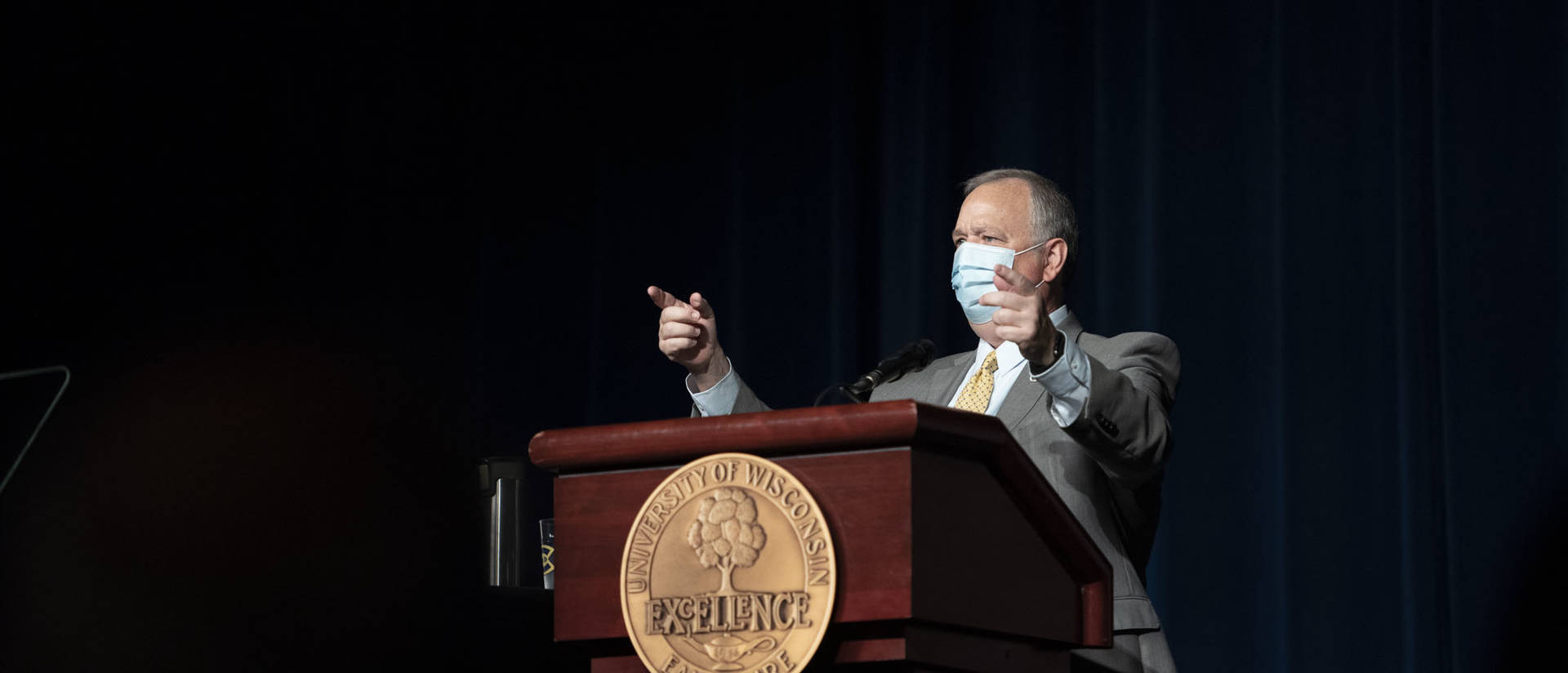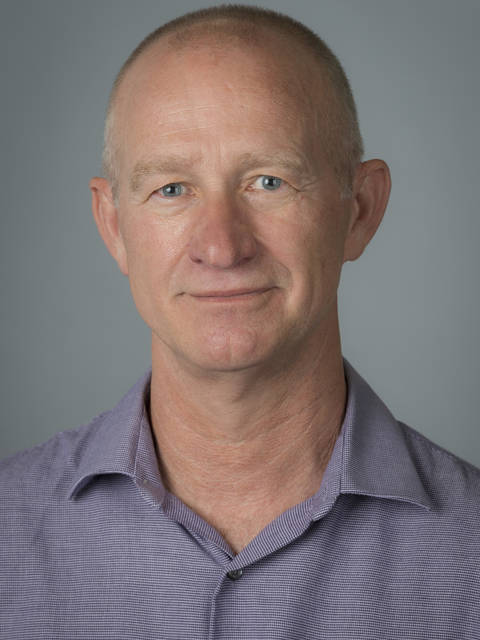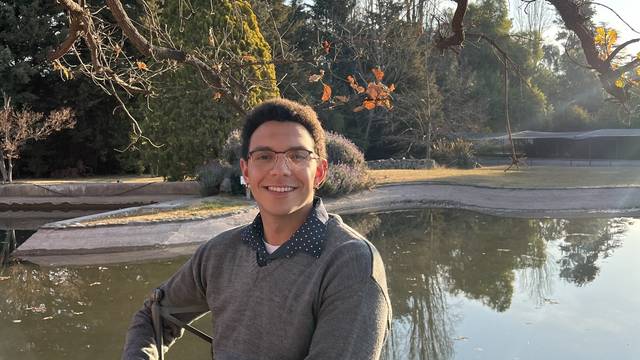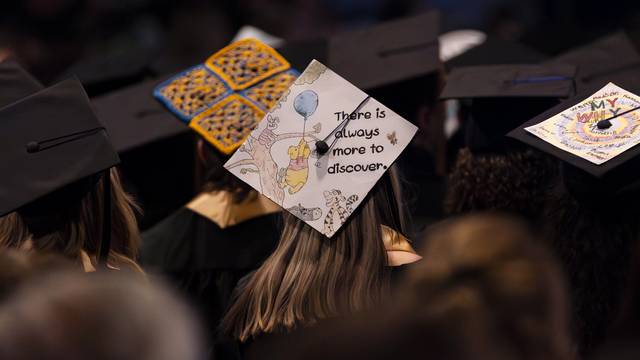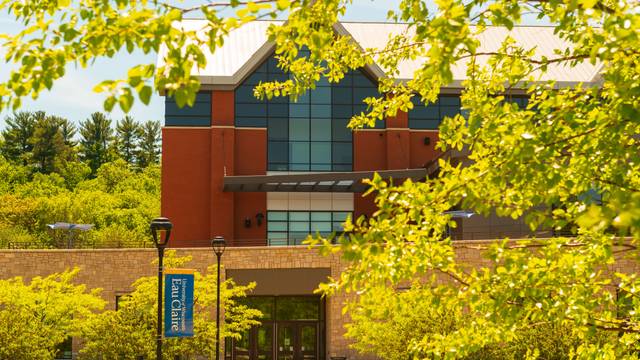Photo caption: Chancellor James Schmidt delivered his state-of-the-university address both virtually and to a masked and physically distanced gathering in Zorn Arena. (Bill Hoepner photo)
The University of Wisconsin-Eau Claire’s resolve in the fight against COVID-19 during the past year demonstrated the impact the university has on the public good, Chancellor James Schmidt told faculty and staff during his annual Blugold Breakfast and academic year opening message on Aug. 24.
In his annual state-of-the-university message delivered both virtually and to a masked and physically distanced gathering in Zorn Arena, Schmidt said a collaboration among UW-Eau Claire – especially nursing faculty and students – and its many partners made the university “the nexus for community health and education in the Chippewa Valley and Rice Lake.”
More than 15,000 COVID-19 vaccines were administered in Zorn Arena and at UW-Eau Claire’s drive-thru site in the past four months.
“Thanks to federal support, partnership with our health departments and your volunteer hours,” Schmidt told faculty and staff, “we were able to offer comprehensive community testing, open our doors to safe instruction and provide communitywide vaccinations, a role that only an institution such as ours could have provided.”
Faculty and staff helped create a unique Blugold experience for students during the 2020-21 academic year. Schmidt said faculty and staff made sacrifices and performed “daily innovations” to find solutions to challenges caused by the pandemic that the university never had faced before.
“I thank every one of you from the bottom of my heart for all you did so we could continue to be a beacon in a dark world for so many of our students,” Schmidt said.
During his message, Schmidt said the university is looking beyond the pandemic to a bigger and bolder future for UW-Eau Claire in 2025. The chancellor said UW-Eau Claire has created a collective vision for the future “that has audacity at its heart.”
“In a nutshell, our 2025 plan asks us to find ways to distinguish ourselves nationally for the innovation and excellence that has always defined us,” Schmidt said.
The university will make equity, diversity and inclusion a defining focus for learning, research and community life, Schmidt said. UW-Eau Claire will elevate undergraduate research and sustainability as core to the Blugold experience.
Schmidt recalled that during his inauguration as UW-Eau Claire’s chancellor eight years ago, he spoke about the public good, audacity and joy. Those themes remain important today, the chancellor said.
UW-Eau Claire will have a continuing role serving the public good by helping to keep the region and university community healthy and safe, Schmidt said.
The university needs to think and act with audacity to ensure students have everything they need to obtain a world-class Blugold education, the chancellor said.
“Every student we admit has demonstrated the ability to succeed with us,” Schmidt said. “It is our moral duty to do all we can to help every one of our students find their place here, become engaged and to accomplish all they can. To do that in a meaningful way, we must be much more creative about how we foster a sense of belonging and help them find their passion – one student at a time.”
Schmidt said that as demographics shift, UW-Eau Claire will look beyond its borders to find new students to enable the university to continue to grow. The university will carve out new areas of distinction and bring national awareness to what is happening at UW-Eau Claire.
“We need you to step up to make a difference and to tackle big ideas,” Schmidt told faculty and staff. “We can be audacious and hold our own as a university for the future.”
The chancellor also recognized winners of the university's 2021 excellence awards: Dr. Rose-Marie Avin, professor of economics and director of the Women’s, Gender and Sexuality Studies program; Dr. Pam Forman, professor and chair of the sociology department and faculty member in the Office of Research and Sponsored Programs; Dr. Sanchita Hati, professor of chemistry and biochemistry; Rob Mattison, senior information systems and technology services videographer in Learning and Technology Services; Signe Matson, lead academic advisor in the Advising, Retention and Career Center; Dr. Heather Ann Moody, associate professor of American Indian studies; Dr. Jeanette Olsen, assistant professor and director of assessment and evaluation in the College of Nursing and Health Sciences; and Kris Presler, professor of mathematics.
